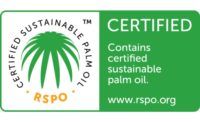As part of the 2019 IBIE BEST in Baking Program, sponsored by IBIE and SF&WB, Cargill was awarded “Top Honors” in the Ingredients category for its work in fostering a higher level of palm oil sustainability while empowering women in Southeast Asia. In order to learn more about this initiative, we reached out to Tai Ullmann, the company’s global sustainability manager.
Douglas J. Peckenpaugh: What is the scope of Cargill’s palm oil program in Southeast Asia?
Tai Ullmann: Globally, Cargill operates 17 refineries, 12 mills and five palm plantations (located in Indonesia). We work with nearly 22,000 smallholder farmers (who have plantations of 2 hectares each). More than 95% of our palm oil volume comes from third parties (about 1,700 mills). Cargill sources palm oil from more than 10 countries and delivers it to hundreds of customers worldwide. Our suppliers are subject to Cargill’s Policy on Sustainable Palm Oil and our Supplier Code of Conduct. See details in Cargill’s Palm Report, page 6.
DJP: How is this program structured to help foster a higher level of sustainability?
TU: As your readers know, palm oil is a key ingredient in bakery applications. To help improve the sustainability of this key ingredient, Cargill is committed to producing and sourcing palm oil in an economical, environmentally sustainable and socially responsible manner. We are working toward a 100% transparent, traceable and sustainable palm supply chain by 2020.
Cargill’s plantations not only support and demonstrate leadership progress against these commitments, (tracked online in our Palm Sustainability Dashboard) but also strive to continually improve and raise the bar on sustainability. This includes a key focus on women empowerment and equality. Women play an important role in advancing agricultural growth and productivity. However, palm production is traditionally a male-dominated industry and women face challenges to inclusion and equality.
DJP: What is Cargill doing to aid the quality of life of women and families who work in Cargill’s palm division in Southeast Asia?
TU: Cargill has put in place two key initiatives to help foster a healthy and safe work environment:
- Comprehensive services, such as strict maternity protection policies including a minimum of three months of maternity leave, breastfeeding support and prevention of discrimination. Our policies are supported through healthcare services that are delivered through 28 clinics. In addition, services include on-site daycare and free primary school education. Today, there are over 800 children attending 36 daycares and 6,000 children attending 46 schools.
- Creation and support of employee networks and committees to help ensure the rights of our female colleagues are upheld. To provide our employees with a physically and psychologically safe workplace, one such committee tracks and addresses harassment reports and serves as a forum for education through seminars and services on dealing with any compromise to women’s rights, and challenges unique to working mothers.
DJP: How will these measures help encourage women to take more leadership positions in Southeast Asia’s palm industry?
TU: If you watch this video, it includes interviews with two women: Yunita Widizsufi, the group sustainability lead, for Cargill Tropical Palm and Rosliani Fitria, general affairs manager at the Harapan Sawit Lestari plantation. Yunita talks about the importance of having gender neutral hiring policies. In other words when a career development opportunity arises all employees regardless of gender can apply as long as they have the proper skills. To the women there, that policy really sets a standard in terms of workforce confidence.
By way of background, you may be interested to hear that Cargill acquired our South Sumatran palm plantation, called PT Hindoli, in 1995. We brought to that business, and our businesses everywhere now throughout 70 countries, what we call our Guiding Principles. These principles represent rules of conduct and ethics by which we conduct business including we obey the law, conduct our business with integrity, treat people with dignity and respect. Our gender equality policies stem from those guiding principle.







